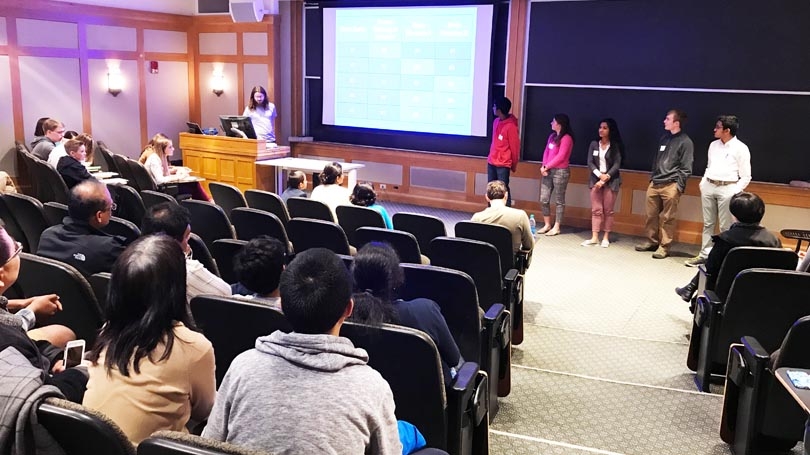
Contestants participate in the jeopardy-style Brain Bee contest, organized by graduate students and post doctoral researchers at Geisel and other programs in the neuroscience community at Dartmouth.
Have you ever wanted to hold a human brain in your hands? Neuroscientists at Dartmouth College recently offered local high school students and their families the unique opportunity to do just that, at the 5th Annual Upper Valley Brain Bee on April 22nd, 2017.
Spearheaded by graduate students at Dartmouth College with administrative support from the Neuroscience Center at Dartmouth, the Upper Valley Brain Bee is an annual neuroscience activities fair and competition that teaches students about the human nervous system. In the months leading up to the competition, graduate students at Dartmouth College visit high schools around the Upper Valley to teach students the basics of neuroscience, instill curiosity for the brain, and to generate excitement and awareness about the Brain Bee competition.
The morning of the Brain Bee included a variety of interactive activity stations that visitors and competitors could try out. One station administered and taught how to give neurological exams, helping students learn how to identify and assess neurological damage. Another station featured real human and sheep brain specimens, generously provided by Geisel School of Medicine’s Department of Medical Education, which students were able to hold and use to identify structures.
Some of the most popular stations harnessed the nervous systems of insects to demonstrate neural communication. For example, the “RoboRoach” station used a cockroach with electrodes implanted in its antenna nerves, allowing wireless control of its movement with a smartphone; students electronically “guided” the cockroach around a behavioral chamber, highlighting how the nervous system is responsible for behaviors in both invertebrate and vertebrate systems.
New to the Bee this year was a booth where students were able to wear a 3D-printed electroencephalogram (EEG) cap connected to a computer showing their brain activity in real time. This allowed students to see that different areas of their brains have different patterns of electrical activity, and how each area is related to their behavior.
The morning session culminated in a special keynote lecture by Jibran Khokhar, Ph.D., instructor and postdoctoral fellow in the Department of Psychiatry at Geisel, who shared his research on substance use and schizophrenia.
The afternoon saw the student competitors participating in a three-part battle of neuroscience proficiency, which tested their knowledge of brain facts, neuroanatomy, and brain disorders. This year, a total of 21 students representing 10 different high schools participated. The last five competitors standing competed in a Jeopardy-style trivia contest, with increasing levels of difficulty as the contest progressed. Although some of these questions would likely stump graduate students, the teenage competitors impressed everyone with the breadth and depth of their neuroscience knowledge.
All students received a certificate of participation recognized by the International Brain Bee organization, and prizes were awarded to the top five competitors. Sithara Nambiar, a junior from Bishop Guertin High School (Nashua, NH), took first place, earning the opportunity to represent New Hampshire next year at the National Brain Bee in Baltimore, MD. Second and third place winners were Anish Kammila, a freshman at Nashua High School South (Nashua, NH), and Morgan Biele, a sophomore at Woodstock Union High School (Woodstock, VT), respectively. Although Sithara has large shoes to fill with last year’s winner, Siddhartha Lavu, placing 12th in the nation, her stunning performance in the final rounds of the competition indicate she has a high chance of success in the nationals.
“The Bee provides students in rural Vermont and New Hampshire schools with access to the exciting field of neuroscience, a specialized biomedical field that is not often included in high school curricula,” says Arielle Baker, a graduate student and one of the Coordinators of this year’s competition. “We know that the Upper Valley Brain Bee has an invaluable impact on the rural communities around the Upper Valley, encouraging young students to pursue and enjoy scholarship.”
Funded by generous contributions by the neuroscience community at Dartmouth, the 5th Annual Upper Valley Brain Bee certainly achieved this success, connecting with high school students to inspire them to consider the workings of the brain and brain research.
The Brain Bee would not be possible without the hard work of coordinators and Geisel students Stephanie Getz, Arielle Baker, and Lucas Dwiel, as well as dozens of other graduate and medical students, postdoctoral fellows, and professors who volunteered their time to share their passion of neuroscience.